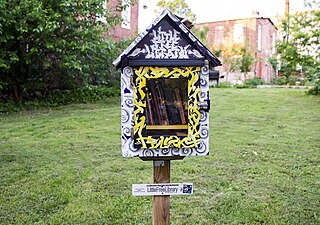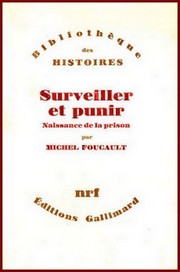Related Research Articles

Discourse is a generalization of the notion of a conversation to any form of communication. Discourse is a major topic in social theory, with work spanning fields such as sociology, anthropology, continental philosophy, and discourse analysis. Following work by Michel Foucault, these fields view discourse as a system of thought, knowledge, or communication that constructs our world experience. Since control of discourse amounts to control of how the world is perceived, social theory often studies discourse as a window into power. Within theoretical linguistics, discourse is understood more narrowly as linguistic information exchange and was one of the major motivations for the framework of dynamic semantics. In these expressions, denotations are equated with their ability to update a discourse context.

Paul-Michel Foucault was a French historian of ideas and philosopher who was also an author, literary critic, political activist, and teacher. Foucault's theories primarily addressed the relationships between power versus knowledge and liberty, and he analyzed how they are used as a form of social control through multiple institutions. Though often cited as a structuralist and postmodernist, Foucault rejected these labels and sought to critique authority without limits on himself. His thought has influenced academics within a large number of contrasting areas of study, with this especially including those working in anthropology, communication studies, criminology, cultural studies, feminism, literary theory, psychology, and sociology. His efforts against homophobia and racial prejudice as well as against other ideological doctrines have also shaped research into critical theory and Marxism–Leninism alongside other topics.

The sociology of knowledge is the study of the relationship between human thought, the social context within which it arises, and the effects that prevailing ideas have on societies. It is not a specialized area of sociology. Instead, it deals with broad fundamental questions about the extent and limits of social influences on individuals' lives and the social-cultural basis of our knowledge about the world. The sociology of knowledge has a subclass and a complement. Its subclass is sociology of scientific knowledge. Its complement is the sociology of ignorance.
The concept of a carceral archipelago was first used by the French historian and philosopher Michel Foucault in his 1975 publication, Surveiller et Punir, to describe the modern penal system of the 1970s, embodied by the well-known penal institution at Mettray in France. The phrase combines the adjective "carceral", which means that which is related to jail or prison, with archipelago—a group of islands. Foucault referred to the "island" units of the "archipelago" as a metaphor for the mechanisms, technologies, knowledge systems and networks related to a carceral continuum. The 1973 English publication of the book by Solzhenitsyn called The Gulag Archipelago referred to the forced labor camps and prisons that composed the sprawling carceral network of the Soviet Gulag.

The History of Sexuality is a four-volume study of sexuality in the Western world by the French historian and philosopher Michel Foucault, in which the author examines the emergence of "sexuality" as a discursive object and separate sphere of life and argues that the notion that every individual has a sexuality is a relatively recent development in Western societies. The first volume, The Will to Knowledge, was first published in 1976; an English translation appeared in 1978. The Use of Pleasure and The Care of the Self were published in 1984. The fourth volume, Confessions of the Flesh, was published posthumously in 2018.
In philosophy, episteme is knowledge or understanding. The term epistemology is derived from episteme.
Governmentality is a concept first developed by the French philosopher Michel Foucault, roughly between 1977 and his death in 1984, particularly in his lectures at the Collège de France during this time.

Discipline and Punish: The Birth of the Prison is a 1975 book by French philosopher Michel Foucault. It is an analysis of the social and theoretical mechanisms behind the changes that occurred in Western penal systems during the modern age based on historical documents from France. Foucault argues that prison did not become the principal form of punishment just because of the humanitarian concerns of reformists. He traces the cultural shifts that led to the predominance of prison via the body and power. Prison is used by the "disciplines" – new technological powers that can also be found, according to Foucault, in places such as schools, hospitals, and military barracks.
Biopower, coined by French social theorist Michel Foucault, refers to various means by which modern nation states control their populations. In Foucault's work, it has been used to refer to practices of public health, regulation of heredity, and risk regulation, among many other regulatory mechanisms often linked less directly with literal physical health. Foucault first used the term in his lecture courses at the Collège de France, and the term first appeared in print in The Will to Knowledge, Foucault's first volume of The History of Sexuality. It is closely related to a term he uses much less frequently, but which subsequent thinkers have taken up independently, biopolitics, which aligns more closely with the examination of the strategies and mechanisms through which human life processes are managed under regimes of authority over knowledge, power, and the processes of subjectivation.
In semiotics, the value of a sign depends on its position and relations in the system of signification and upon the particular codes being used.
Problematization is a process of stripping away common or conventional understandings of a subject matter in order to gain new insights. This method can be applied to a term, writing, opinion, ideology, identity, or person. Practitioners consider the concrete or existential elements of these subjects. Analyzed as challenges (problems), practitioners may seek to transform the situations under study. It is a method of defamiliarization of common sense.
In social theory and philosophy, antihumanism or anti-humanism is a theory that is critical of traditional humanism, traditional ideas about humanity and the human condition. Central to antihumanism is the view that philosophical anthropology and its concepts of "human nature", "man" or "humanity" should be rejected as historically relative, ideological or metaphysical.

The Archaeology of Knowledge by Michel Foucault is a treatise about the methodology and historiography of the systems of thought (epistemes) and of knowledge which follow rules that operate beneath the consciousness of the subject individuals, and which define a conceptual system of possibility that determines the boundaries of language and thought used in a given time and domain. The archaeology of knowledge is the analytical method that Foucault used in Madness and Civilization: A History of Insanity in the Age of Reason (1961), The Birth of the Clinic: An Archaeology of Medical Perception (1963), and The Order of Things: An Archaeology of the Human Sciences (1966).

The Order of Things: An Archaeology of the Human Sciences is a book by French philosopher Michel Foucault. It proposes that every historical period has underlying epistemic assumptions, ways of thinking, which determine what is truth and what is acceptable discourse about a subject, by delineating the origins of biology, economics, and linguistics. The introduction to the origins of the human sciences begins with detailed, forensic analyses and discussion of the complex networks of sightlines, hidden-ness, and representation that exist in the group painting Las Meninas by Diego Velázquez. Foucault's application of the analyses shows the structural parallels in the similar developments in perception that occurred in researchers' ways of seeing the subject in the human sciences.
Indeterminacy, in philosophy, can refer both to common scientific and mathematical concepts of uncertainty and their implications and to another kind of indeterminacy deriving from the nature of definition or meaning. It is related to deconstructionism and to Nietzsche's criticism of the Kantian noumenon.
Ecogovernmentality, is the application of Foucault's concepts of biopower and governmentality to the analysis of the regulation of social interactions with the natural world. The concept of Ecogovernmentality expands on Foucault's genealogical examination of the state to include ecological rationalities and technologies of government. Begun in the mid-1990s by a small body of theorists the literature on ecogovernmentality grew as a response to the perceived lack of Foucauldian analysis of environmentalism and in environmental studies.
In the philosophy of Michel Foucault, a dispositif or dispositive is any of the various institutional, physical, and administrative mechanisms and knowledge structures which enhance and maintain the exercise of power within the social body. The links between these elements are said to be heterogeneous since knowledge, practices, techniques, and institutions are established and reestablished in every age. It is through these links that power relations are structured.
In philosophy, genealogy is a historical technique in which one questions the commonly understood emergence of various philosophical and social beliefs by attempting to account for the scope, breadth, or totality of discourse, thus extending the possibility of analysis. Moreover, a genealogy often attempts to look beyond the discourse in question toward the conditions of their possibility. It has been developed as a continuation of the works of Friedrich Nietzsche. Genealogy is opposed to the Marxist use of ideology to explain the totality of historical discourse within the time period in question by focusing on a singular or dominant discourse (ideology).
Foucauldian discourse analysis is a form of discourse analysis, focusing on power relationships in society as expressed through language and practices, and based on the theories of Michel Foucault.
On the proposal of Jules Vuillemin, a chair in the department of Philosophy and History was created at the Collège de France to replace the late Jean Hyppolite. The title of the new chair was The history of systems of thought and it was created on November 30, 1969. Vuillemin put forward Michel Foucault to the general assembly of professors and Foucault was duly elected on 12 April 1970. He was 44 years old, and at the time was relatively unknown beyond the borders of his native France. As required by this appointment, he held a series of public lectures from 1970 until his death in 1984. These lectures, in which he further advanced his work, were summarised from audio recordings and edited by Michel Senellart. They were subsequently translated into English and further edited by Graham Burchell and published posthumously by St Martin's Press.
References
- Foucault, M. The Order of Things: An Archaeology of the Human Sciences. Vintage; Reissue edition (1964) ISBN 0-679-75335-4